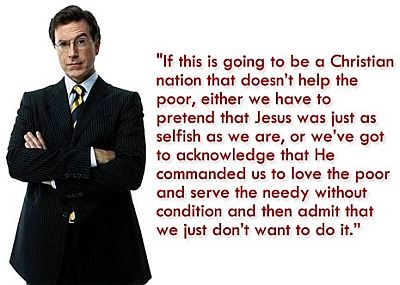A Leader
is a fellow
who refuses to be crazy
the way everybody else is crazy
and tries to be crazy
in his own crazy way.
Peter Maurin, "Easy Essays."
The idea of prophecy has been rolling around in my head for a while now. I am not sure why. I remember in my early days of blogging, coming across Christian bloggers who would write about "prophetic words" that they had been given, or which their pastor had uttered, or some writer had shared. Some were concerned with the end times. I passed over them. Jesus seemed pretty adamant that worrying about the end of the world was not our business, and was rather a distraction than anything else (Matthew 24:36, Mark 13:32).
Perhaps the issue was that I, and all of these bloggers, seemed to interpret prophecy as a prediction for the future. I have very little to say about that. I acknowledge that such things are possible, by God's grace, but am not much interested in it. I know that the future is in God's hands. My task is to live it with Him as it happens. The same goes for the end of the world. In all likelihood, whether the world ends any time soon or not, I will die sometime in the next 70 years or so. My task is to die a little bit every day in order to live more fully the Divine life. The world ending or continuing is largely irrelevant to that task.
However, recently I have been drawn to considering prophecy outside of the strict theological sense of a prediction of future events, or revelation of unknown events, and drawing a broader meaning. For instance, very little of the work of prophets in the Bible relates to predicting the future. Predictions occur, but they seem to be a highlight of the job, rather than part of the day to day grind. Instead, the much of the times the prophets of the Old Testament seem to be more concerned with reminding, correcting, exhorting, warning and admonishing. They give concrete instructions, and they bring the law back to mind.
In a sense, they communicate the idea of a living relationship with God, based on dialogue, rather than simply a set of rules that no one remembers anyway. I am most struck by the fact that being a prophet in the Old Testament is an uncomfortable proposition. People don't like being told they are not just wrong, but dead wrong, and they are going to pay the price if they don't shape up. "They say to the seers, 'See no more visions!' and to the prophets, 'Give us no more visions of what is right! Tell us pleasant things, prophesy illusions.'" Isaiah 30:10.
This admonishing of sinners can be thought of as a reminder, call back to their true desires. Of course, in strict mystical theology, a prophecy is a direct revelation from God, in this broader sense it is the birthright, and indeed the calling, of all Christians. In my last blog I spoke of the central aloneness of each human being, created as we are in calling to a "unique, exclusive, and unrepeatable relationship with God Himself." In the blog before that I spoke of art as a sort of prophesy. Both of those posts anticipated this one.
 In the poem I posted on August 10th I dimly saw the necessity of prophecy as a reminder. The question, "Are you happy?" is a prophetic question, because the answer for any thoughtful, honest person can never be an unqualified, "yes." There is always some dissatisfaction, some incompleteness. We do not live as fully as we might live. We do not give as fearlessly as we might. To be reminded of that is uncomfortable. It makes me squirm. To be shown the gifts that currently sit stagnating in the abandoned warehouses of my life is to be reminded that I have never done enough. I fall short of total gift. The thought makes me squirm and I turn on the x-box and play Nazi zombies to distract myself. I putz about on youtube, clicking from one epic rap battle to the next, as all the while precious moments slip by, moments in which I am not praising God or serving my fellow man. I am not creating art, or absorbing beauty. I am being entertained. I do not want to be reminded. I want to be "distracted from distraction by distraction."
In the poem I posted on August 10th I dimly saw the necessity of prophecy as a reminder. The question, "Are you happy?" is a prophetic question, because the answer for any thoughtful, honest person can never be an unqualified, "yes." There is always some dissatisfaction, some incompleteness. We do not live as fully as we might live. We do not give as fearlessly as we might. To be reminded of that is uncomfortable. It makes me squirm. To be shown the gifts that currently sit stagnating in the abandoned warehouses of my life is to be reminded that I have never done enough. I fall short of total gift. The thought makes me squirm and I turn on the x-box and play Nazi zombies to distract myself. I putz about on youtube, clicking from one epic rap battle to the next, as all the while precious moments slip by, moments in which I am not praising God or serving my fellow man. I am not creating art, or absorbing beauty. I am being entertained. I do not want to be reminded. I want to be "distracted from distraction by distraction."
But this reminder is a spiritual work of mercy. If I cannot be holy yet, I should at least be uncomfortable. I should not be content with mediocrity. "Let a righteous man strike me—it is a kindness; let him rebuke me—it is
oil for my head; let my head not refuse it. Yet my prayer is continually
against their evil deeds." Psalm 141:5.
I think this is why I talked the day before yesterday about the necessity of doing something radical. I remember saying once, at a party of all places, when the conversation had turned to tricks and gimmicks that people resort to in order to seem mysterious, that a human being should not need to try to be mysterious. Each human person is a mystery. If you live as you were meant to live, true to the face of God that you alone and no one else can see, then you will be mysterious. People will not get you. You will be asked to explain yourself.
In fact, if you have never done something that seemed absolutely crazy to everyone else, but which you knew you had to do, it is probably a good indication that you have never lived.





